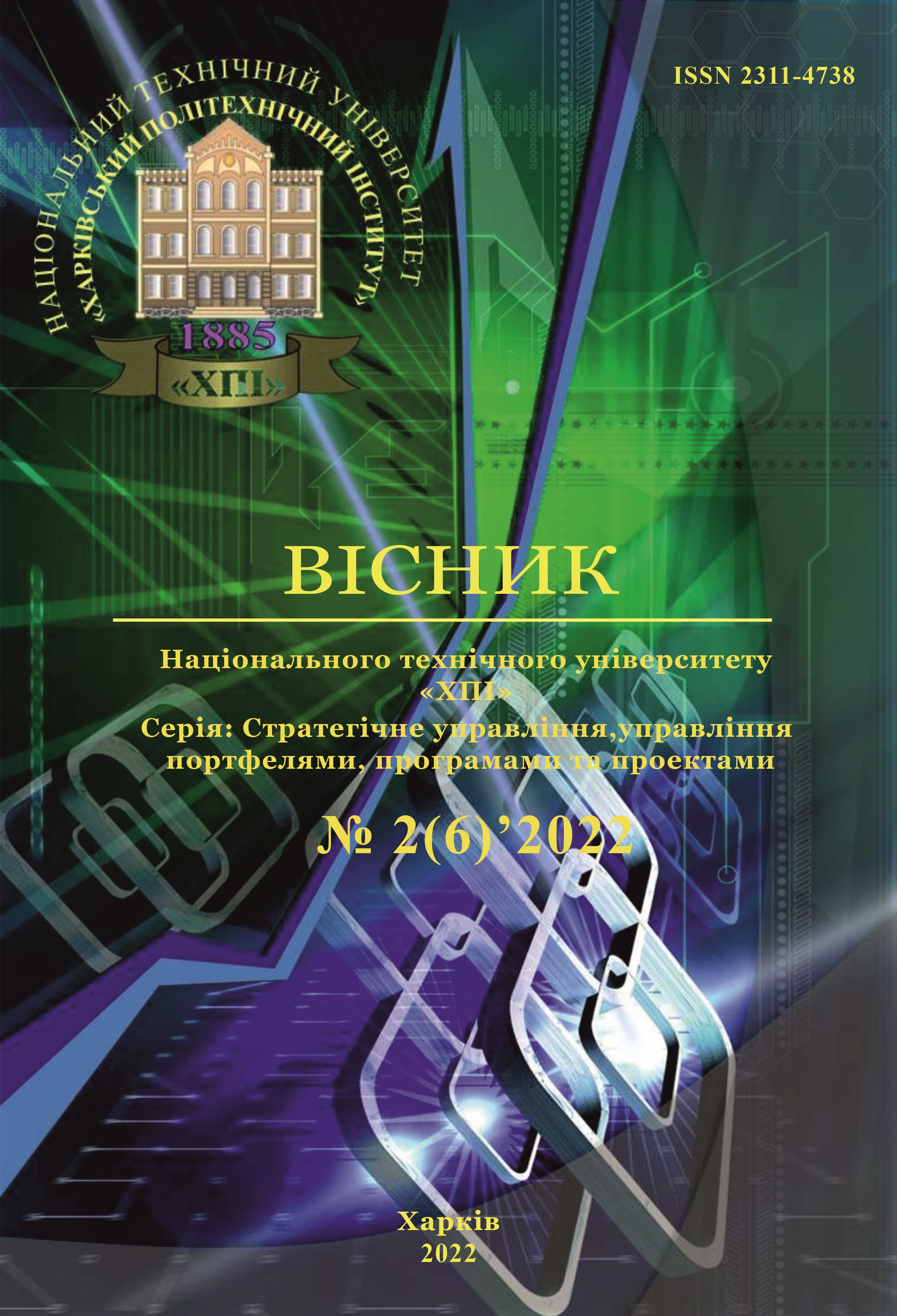METHOD OF STAKEHOLDERS’ IDENTIFICATION BASED ON THEIR VIEWS IN STRATEGIC MANAGEMENT OF SOCIAL PROGRAMS
DOI:
https://doi.org/10.20998/2413-3000.2022.6.8Keywords:
stakeholder; strategic management; social programs; project management; program management; inclusion; socio-economic reformsAbstract
There has been proposed the method of stakeholders’ identification in strategic management of social programs. It is designed to recognize and assess the strength of causal relationships of failure of social projects and programs. The method is based on the differentiation of stakeholders by their ideas, which is revealed in the example of inclusive educational projects. The concept of stakeholder priority number has been introduced. The matrix "risk priority number" / "stakeholder priority number" is offered. We have developed the method of stakeholders’ identification based on their views in the strategic management of social programs, which consists of 7 Steps. Step 1: development of a questionnaire for the cause-and-effect relationships of the failure of inclusive educational projects according to the imagination of stakeholders of different groups. Step 2: survey of respondents with differentiation by stakeholder priority number and three groups of stakeholders: the state as a system of institutions; citizens with disabilities or their legal representatives; neurotypical visitors to institutions or their legal representatives. Step 3: investigation of stakeholders' perceptions of the cause-and-effect relationships of failure of inclusive projects according to the 6M method (Lan, Machines, Materials, Methods, Measurements, Mother-nature). Step 4: charting of Isikawa diagrams. Step 5: quantification of the strength of the identified relationships according to the Failure Mode and Effects Analysis method based on the results of a survey of respondents using the method of calculating the priority number of risk of failure mode. Step 6: ranking of the reasons for failure modes according to the "risk priority number" / "stakeholder priority number" matrix. Step 7: development of conclusions and recommendations. The analysis of the results of the poll with the identification of causal links will identify areas of disparity in the views of various stakeholders on the reasons for the failure of inclusive educational projects. Quantifying them makes it possible to identify the most important aspects that need to be addressed as a matter of priority on the part of project and program managers.
References
On the Goals of Sustainable Development of Ukraine till 2030: Decree of the President of Ukraine. Electronic resource. Available at: https://zakon.rada.gov.ua/laws/show/722/2019
Research on the quality of inclusive education for children with special educational needs. State Service for Quality Assurance of Education of Ukraine of Ukrane. Official site. Electronic resource. Available at: https://sqe.gov.ua/wp-content/uploads/2021/04/Doslidzhennya-yakosti-inklyuzivnoi%CC%88-osviti.pdf
Kadykova I. M., Chumachenko I.V. The role of the institute of trust in the management of communications of social projects. Bulletin of NTU "HPI". Series: Strategic Management, Portfolio, Program and Project Management. 2015. No. 2. pp. 51–56.
Bushuyeva N. S. Models and methods of proactive organization development programs management. Kiyv, Naykovy Svit, 2007. 200 p.
Bushuev S. D., et al. Creative technologies of the project and program management. Kyiv, Summit-Book, 2010. 768 p.
A Guide to the Project Management Body of Knowledge: PMBOK (®) Guide. 6th edition. Project Management Institute. 2017. 725 p.
Kadykova I.M., Larina S.O., Chumachenko I.V. Method of determining the expectations of stakeholders and their adjustment in the strategic management of the project program. The current state of research and technology in industry. 2019. No. 1 (7). рp. 51-58.
Kadykova I.N., Miroevskaya E.V. The role of modern software products in the context of the formation of the knowledge economy. Tavriyskiy economic journal. 2011. No. 6. рр. 47-48.
Valdrieva Z.R., Fandrova L.P. Optimization of the company through the development of business processes in the Business Studio system. Information Technology. Radio electronics. Telecommunications. 2016. No. 6-1. рр. 115-121.
Bushuyev S., Molokanova V. Formalisation of the accounting valuable memes method for the portfolio of organization development and information computer tools for its implementation. Information technology and learning tools. 2017, vol. 62, No. 6, рр. 1-15.
Bourne L. Stakeholder relationship management: a maturity model for organisational implementation, CRC Press, New York, USA. 2016.
Brilenok A. A. Monitoring quality management system processes. Quality management methods. 2010. No. 5. рр. 24-29.
Downloads
Published
Issue
Section
License

This work is licensed under a Creative Commons Attribution-NonCommercial-ShareAlike 4.0 International License.
Our journal abides by the Creative Commons copyright rights and permissions for open access journals.
Authors who publish with this journal agree to the following terms:
Authors hold the copyright without restrictions and grant the journal right of first publication with the work simultaneously licensed under a Creative Commons Attribution-NonCommercial-ShareAlike 4.0 International License (CC BY-NC-SA 4.0) that allows others to share the work with an acknowledgement of the work's authorship and initial publication in this journal.
Authors are able to enter into separate, additional contractual arrangements for the non-commercial and non-exclusive distribution of the journal's published version of the work (e.g., post it to an institutional repository or publish it in a book), with an acknowledgement of its initial publication in this journal.
Authors are permitted and encouraged to post their published work online (e.g., in institutional repositories or on their website) as it can lead to productive exchanges, as well as earlier and greater citation of published work.

